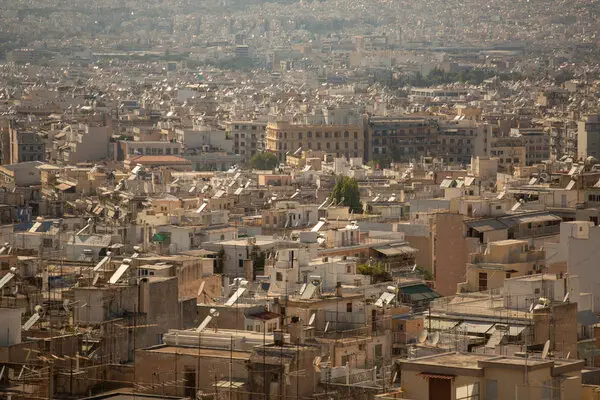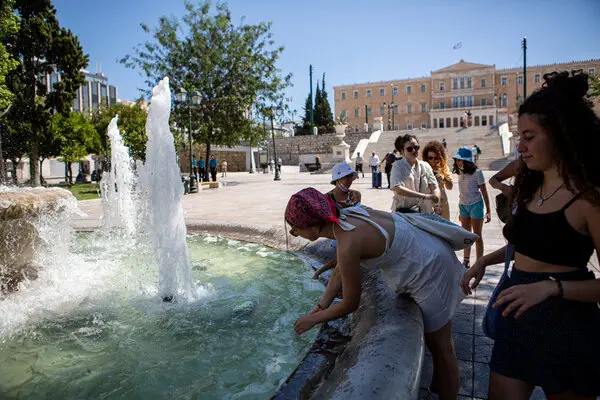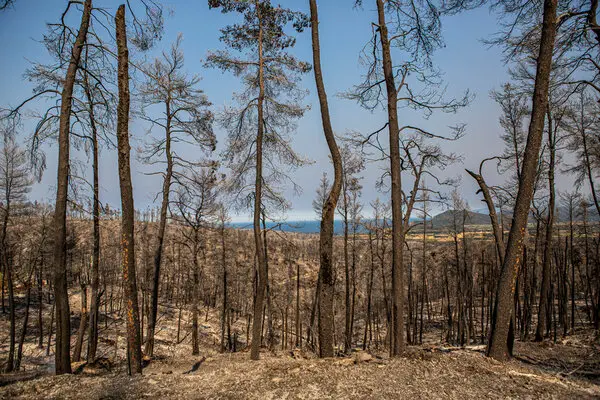Athens Is Only Getting Hotter. Its New ‘Chief Heat Officer’ Hopes to Cool It Down.
Eleni Myrivili has been tasked with finding ways to help the Greek capital cope with ever-hotter heat waves that are expected to be part of life for years to come.

“I could only take short, kind of burning breaths,” she said, recalling that ash from the fires also turned her black clothes white. “It was scary.”
The heat’s intensity (as high as 44 degrees on the Celsius scale) only increased the urgency that Ms. Myrivili brings to her new job as Athens’ — and Europe’s — first “chief heat officer,” tasked with giving one of the world’s most ancient cities an inhabitable future.
As heat waves have been scorching Athens, the continent’s most sweltering capital, new wildfires broke out this past week in the city, adding to the more than 200,000 acres of forest consumed by wildfires around the country.
It is not just Greece. In recent days, a heat wave on the Italian island of Sicily appears to have resulted in the hottest recorded temperature in European history, and fires have broken out across the Italian south. Europe’s summer of natural disasters has included increasingly frequent extreme weather events that have caused fatal flooding in Germany and Belgium, as well as in Turkey. Every week there is a new nightmare.

Ms. Myrivili’s appointment is a recognition of that new reality. But it is also a foreboding sign that having someone to grapple with suffocating temperatures may be a mainstay of the municipal cityscape, as necessary and unremarkable as a transportation, sanitation or police commissioner.
“Heat is an invisible and insidious killer,” Ms. Myrivili said. “Heat is one of those climate hazards that you don’t really see. It’s hard for people to talk about it. You don’t see flying roofs and cars flooded. It is really important to get people to understand why it is dangerous.”
She predicted that without action, the future for Athens would be bleak and airless. The capital would become more of an “urban heat island,” she said, with empty squares and cafes, fewer tourists and an exodus of residents who have the means and opportunities to live elsewhere.
But Ms. Myrivili said the conditions that made the city so challenging also made it an “interesting pilot program” for the region. Athens straddles the cultures of Europe and the Middle East, East and West, and is neither extremely rich nor poor. “It’s a good city to try things out and see what works,” she said.
Athens, the second most densely populated city in Europe after Paris, often heats up like an oven.

Apartment buildings known as polykatoikies were erected in the capital in an anarchic explosion of garden-swallowing development after Greece’s civil war to accommodate a great migration from the countryside. But the buildings’ cement and tar-blackened rooftops absorb the heat. And as Athens sprawled into the surrounding mountains, and the car became king, the city added miles of asphalt that reach searing temperatures. The lack of green spaces in Athens deprives residents of respite, and even when temperatures fall at night, streets and buildings ooze heat.
“At night, the city gets very hot and you can’t cope, and the baby wakes up in the middle of the night from the heat,” Carene Kengne, 25, said as she pushed a stroller, shading herself and her baby boy under a kiosk. She said she did not have air-conditioning in her apartment, and that the surrounding fires and intense heat, much higher than in her native Cameroon, scared her.
Even the school where she learns Greek canceled her language lessons because it was too hot. “They told us to stay at home,” she said.
Without a chance to cool down, Athens residents risked serious health issues. As did those who had to toil in the sun.

Converting Athens into a city that can mitigate the heat has been Ms. Myrivili’s obsession since 2007, when she watched TV footage of Greek wildfires from her mother’s Athens apartment.
So Ms. Myrivili, the granddaughter of Stratis Myrivilis, a novelist regarded as one of Greece’s most important 20th-century writers, decided to get into politics.
A social anthropology professor, Ms. Myrivili was elected to the Athens City Council in 2014 and served as a deputy mayor from 2017 to 2019, focusing on the city’s resilience amid climate change.
Out of government, she eventually became a leader on heat and urban resilience issues for the Adrienne Arsht-Rockefeller Foundation Resilience Center. The group has engineered placing heat officers on every continent. This year, Miami-Dade County in Florida appointed North America’s first heat officer, and Freetown in Sierra Leone is expected to make Africa’s first such appointment soon.
The mayor of Athens, Kostas Bakoyannis, appointed Ms. Myrivili in July and gave her instructions to carve out a role with real influence for herself and her successors, and to help advise other baking European cities.

Leave a Reply